George Clooney Leatherheads Interview
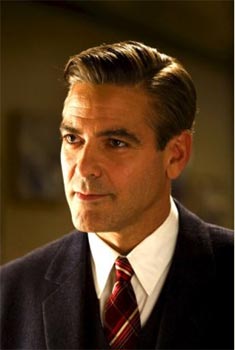
George Clooney Steals from the Best, he confesses.
George Clooney, Leatherheads Interview by Paul Fischer.George Clooney, Oscar winner, is every bit the movie star yet off screen, is always gracious, funny and passionate. Clooney takes on his most ambitious film to date, directing and starring in the 1925-set screwball comedy Leatherheads, inspired by the greats of the past. In the movie, Clooney is adept as Dodge Connolly, a charming, brash football hero who is determined to guide his team from bar brawls to packed stadiums. But after the players lose their sponsor and the entire league faces certain collapse, Dodge convinces a college football star to join his ragtag ranks. The captain hopes his latest move will help the struggling sport finally capture the country's attention. Welcome to the team Carter Rutherford, America's favorite son. A golden-boy war hero who single-handedly forced multiple German soldiers to surrender in WWI, Carter has dashing good looks and unparalleled speed on the field. This new champ is almost too good to be true, and Lexie Littleton aims to prove that's the case. A cub journalist playing in the big leagues, Lexie is a spitfire newswoman who suspects there are holes in Carter's war story. But while she digs, the two teammates start to become serious off-field rivals for her fickle affections. As the new game of pro-football becomes less like the freewheeling sport he knew and loved, Dodge must both fight to keep his guys together and to get the girl of his dreams. Finding that love and football have a surprisingly similar playbook, however, he has one maneuver he will save just for the fourth quarter.
In this interview Clooney talks about the challenges of starring in and directing a broad comedy and confesses that he is unlikely to do that kind of serious double duty again.
If I spend time with you there is alcohol involved. I'll say that right off the bat.
Paul Fischer: I take it you were influenced by Howard Hawks.
George Clooney: I stole from Howard Hawks and Preston Sturges in a big way. I stole a scene. I'm trying to think of who all I stole from. Wait, 'homage'. I homaged the shit out of Howard Hawks and Preston Sturges. And early George Stevens. There is a film called "The More the Merrier" we were trying to rip off a lot.
Paul Fischer: When you started scouting locations in North and South Carolina, what led you to use parts of these cities for these films? And could you describe your shoot in North Carolina in general?
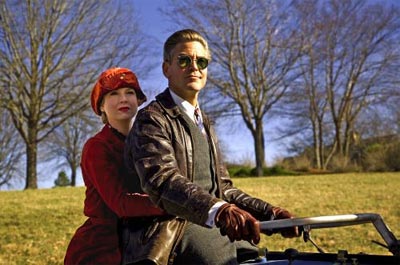 George Clooney: I never really was in North Carolina. No, it was real fun. The scout was easy because we were looking for a place that would have something of a change of seasons, but not quite the Minnesota change of seasons to shoot the February. It just didn't seem fun to us. It didn't seem that we would catch everything we wanted. We needed some scenes with trees. We knew that digitally we could change the colors from green to orange and red if there leaves on the trees, but that the area would be great for old stadiums which were important to us and also a bit of a change of season. We ended up getting caught in some pretty cold weather, shockingly, which was unfortunate, but I'm telling you, we loved both the Carolinas. I grew up in Kentucky which we think of as the south, but Carolina's think of as the Yankees somehow, but I still think of us as the South and I always appreciate -- it's a very different way of life down there. People have a very easygoing nature with you there and I found it to be every bit the case. You know, we had to use hundreds of hundreds of extras, ah, background artists sorry. It was important that we sort of had an understanding. They are not just people in the background. We actually used them. We used their faces. We had to have - We had long talks together in big groups of people and it was easy to do. They were really open and friendly and fun. I couldn't tell you what a great time we had.
George Clooney: I never really was in North Carolina. No, it was real fun. The scout was easy because we were looking for a place that would have something of a change of seasons, but not quite the Minnesota change of seasons to shoot the February. It just didn't seem fun to us. It didn't seem that we would catch everything we wanted. We needed some scenes with trees. We knew that digitally we could change the colors from green to orange and red if there leaves on the trees, but that the area would be great for old stadiums which were important to us and also a bit of a change of season. We ended up getting caught in some pretty cold weather, shockingly, which was unfortunate, but I'm telling you, we loved both the Carolinas. I grew up in Kentucky which we think of as the south, but Carolina's think of as the Yankees somehow, but I still think of us as the South and I always appreciate -- it's a very different way of life down there. People have a very easygoing nature with you there and I found it to be every bit the case. You know, we had to use hundreds of hundreds of extras, ah, background artists sorry. It was important that we sort of had an understanding. They are not just people in the background. We actually used them. We used their faces. We had to have - We had long talks together in big groups of people and it was easy to do. They were really open and friendly and fun. I couldn't tell you what a great time we had.Paul Fischer: How does Clooney the director work with Clooney the A-list movie star and survive? Also, why weren't you in the Jimmy Kimmel/Ben Affleck video?
George Clooney: You know they asked me to. I was working. I would have liked to have been in that because I do love Jimmy Kimmel. I have been with Ben Affleck and I will say on the record, he is a bobcat in the sack. It's funny, the three films I directed, the other two, I had parts in them, but I wasn't the lead. And it's tricky cause there is an enormous amount of narcissism that comes into play. You are really, truly …y'know, you are breaking the trust between two actors. In particular if you are in the lead. If you and I are doing a scene together and we're talking, I'm not supposed to be judging you as an actor. Now, a lot of actors do and they'll tell you what to do, but in general you're not supposed to break that trust, the director is. So, if we are doing a scene and we finish and I go, 'O.K., cut. Y'know, try it like this.' It really requires an amount of…you have to go to each of the actors before you start and say, 'Listen, this is going to be awkward.' And just get it out in the open and lay it out early and say, 'It's gonna be strange all the way around.' As an actor, it's easy because I know specifically, precisely what I need in the scene. So, I have cut out one step of the director having to explain it. But it's embarrassing when you are doing it with. You're sitting across from Rene and she's doing a tremendous job in the scene and you can feel the camera is in too close too soon. And you just go, 'Cut. O.K., you're in too soon. Let's try it again.' It's a weird awkward thing and you just acknowledge it right off the bat and get over it.
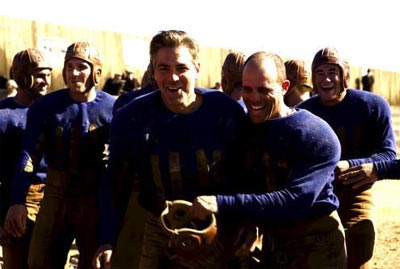 Paul Fischer: Thinking about the screwball nature of the film. Timing the dialogue, it seems like something that wouldn't be very natural to be thinking about your next line?
Paul Fischer: Thinking about the screwball nature of the film. Timing the dialogue, it seems like something that wouldn't be very natural to be thinking about your next line?George Clooney: We called it front foot acting. The tendency actually since Montgomery Clift came on the scene is to internalize and it's great and made for some of the most amazing work ever, but what gets lost in that is that ability to you're almost answering like you just as if you couldn't have heard the question. It has to be sort of that quick. The difference is you can't do it exactly like Rosalind Russell. She was brilliant, but if you took that performance and put it into a modern film, even if was supposed to be an older film. 'Sure, whatever, I don't care.' It's so…it would just be like an impersonation. So, with someone like John or someone like Rene, they are actors who don't feel contemporary which is important. There are some actors who feel like it's just 2008 no matter what you do. We had the same problem with 'Good Night, and Good Luck.' You had to have actors who didn't fill everything with 'Y'know.' That are good at being very crisp and clean and both of them are very crisp, clean actors. And then you had to go. We rehearsed the scene as if you'd heard it all and then I'd go, 'Go, go, faster, faster, faster.' Too the point where it's too fast and then you just slow it down. It's just one of those things were you have to understand that it's a rollercoaster and you go really quick and then slow down. And that finds itself when you rehearse it a few times on the set.
Paul Fischer: Coens did that in 'The Hudsucker Proxy' did you talk to them about it at all?
George Clooney: No, but I certainly watched 'Hudsucker Proxy,' because, y'know, I've stolen and homaged the hell out of those guys over the years and certainly there were things about this film that I was using more along the lines of other films they have done, but 'Hudsucker' I love. I know people love to smash that film, but I really love that movie. Yeah, so, you have to be careful that it doesn't leak into an impersonation of any kind. Y'know, we had, there was a trick to this. When you are doing a period film, in particular a football film, an action film, there are weird use to it now of hand held cameras and steady cams. You can really increase the excitement level of football. If you were to do that in a period piece, in 1925 in particular, you would immediately sell out the period. Immediately you would feel that it was contemporary. 'Oh, why was is this hand held with the camera?' You have to shoot it in a way we are sort of used to seeing that world which is straighter. Everything is going to be on a crane arm. Or everything was going to be on a dolly track and it's going to be slower, so you had to find ways to move the camera toward the action always. It was a really tricky balance. And the actors had to find a way to perform like that too, because if you are going to keep things in a two-shot, you've go to keep it moving and you've got to keep the dynamic.
Paul Fischer: Like the scene with the cow?
George Clooney: Like the scene with the cow. That Cow almost killed us that thing. I'm telling you man, it took us four different times to get that cow to stand still and look. "Look over here.' It's like working with Krasinksi really. It's very similar.
Paul Fischer: When we talk to actors who direct they say they didn't expect it to be so difficult. So, as they go on, they tend to act less in their pictures. Here, you've actually increased you're screen time.
George Clooney: Yes, the next one is a one-man show. I'm doing 'Catch 22' - one-man show.
Paul Fischer: Honestly, do you feel comfortable with that and do you want to do that again?
George Clooney: No. The truth is, I did it because this was a part for a long, long, long time I wanted to play and I thought I was the right guy to play it. And I also thought, 'I'm 46. If I don't do it now, I'm done. This is my last shot at it.' And, Soderbergh was going to do it in 1998 when we were going to do it and I was very excited about that sort of prospect and things sort of moved on and the script wasn't in shape. We were sort of in pre-production, but we had an outline. We had two or three scenes that we loved and characters that we loved, but we didn't have a plot. So, right after 'Good Night, and Good Luck' and Syriana, after that year, everything that was coming to me was issues films.
They were happy to let me direct, but it was the Richard Clark book. It was 'We are going to do the big Valerie Plane story.' It was going to be something political and I had a great fear of being the 'issues director,' because the issues change and I have a much bigger interest in being a director. So, I want to do something that is completely away from this and I like screwing with different genres. This was a world I knew a little of. The kind of style of film I knew. So, I spent a summer stealing from 'The Philadelphia Story,' homaging the hell out of those films and came up with - the thing I came up which was horrible really, was the whole John Kerry/Swift Boat thing, where I came up with the idea that he's holding a secret, but he's not really...not that I thought that John Kerry wasn't, but what if he really wasn't a war hero? And if there was an innocent way to do it where you didn't make him a bad guy. And 'Hail the Conquering Hero' sort of helped with that too.
So, I was sort of stuck in this world where I was going to direct it and I was going to play the lead. What I hadn't paid attention to was that I was also going to play football and it to hurt. The first day I got hit by some 21-year-old who knocked me on my ass and I was like, 'O.K., I'm in trouble because I have four more months of this.' But I would never, by design, do a film that I would play the lead in ever again. It was one of those things where it all came together very quickly. But, it was a dumb move in some ways. It was a little too much to take on.
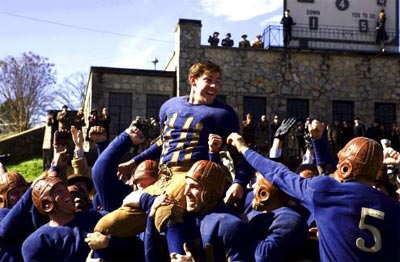 Paul Fischer: This movie talks about issues like freedom of the press, the commercialization of sports, and you have a joke about drunken financiers.
Paul Fischer: This movie talks about issues like freedom of the press, the commercialization of sports, and you have a joke about drunken financiers. George Clooney: You gotta throw some stuff in.
Paul Fischer: How personal is this movie?
George Clooney: There are things about it. I thought this was more like 'Butch Cassidy and the Sundance Kid' which was someone is desperately holding on to something that has long since sailed. It's inevitable that it's gone away and you are just holding on to this great memory because you're not willing to grow up probably. That was probably the world I was looking at. In order to save it, you're going to have to basically destroy it and destroy it in his mind, which is to make it commercial and then make it have rules and play by the rules. It's more about, you can nail me on that about not wanting to grow up, you got me there, but those things are just bits. I do think, I do look back at things that were less commercial at times and think they were pretty fun. I love films like 'Slapshot' for those reasons. There are no rules to it. People are getting hit in the face. Punched in the nose all the time. It makes me laugh and I think it's really ripe for comedy. It's easier to do that than make a modern day football comedy. I think it's harder to do.
Paul Fischer: And the whole thing about Rene as a reporter? The integrity of the press?
George Clooney: I had already done a film about that. This one was more about the idea that I wanted to give John Krasinki's character a secret. In the original draft of the film, John's character and Lexi were boyfriend and girlfriend in college and they came out together. So, what happened, was she wasn't active. There was nothing for her to do and nothing to get. And I was now, too old to be stealing the college girl. Unfortunately, that happened. (Laughs.) So, I keep telling myself.
So, it felt as if that needed to be changed and she needed to have something to do. So, really it was more about let's give her - obviously, there weren't women sportswriters in 1925 and they are fighting to do it now even, so we thought that was a great ballsy thing to be. But it wasn't a comment on the press on that one. I was just having fun.
Paul Fischer: And the shot of the newlyweds at the end? Are we being prophetic there?
George Clooney: Yes, Rene and I were married. (Laughs.)
Paul Fischer: What kind of idiot are you playing in the next Coen bros. and what was your reaction to Tilda's Oscar speech which was so much fun?
George Clooney: Oh, it was funny. I don't like Tilda either. (Laughs.) Well, first of all, I'm playing this character Harry Pfarrer in 'Burn After Reading' and I am now over, I have leaped heads and shoulders over the other idiots I have played. This is my trilogy of idiots with the Coen bros. That one is gonna be fun. I actually had to go and do an extra shot yesterday. I grew a beard back for half a day's work. And I went in there and they showed me little bits of it and I was like, 'Turn it off, I don't want to see it. It's so big.' It will be fun though I think. The only thing that makes me feel good is that I think Brad is a bigger idea than I am in it so it makes me feel safe. And Tilda kills me. She is one of the dearest, funniest. It's funny, she plays these uptight characters all the time and she is just funny as hell and always cracks me up. And I will get her back for the Batsuit line somewhere along the way.
Paul Fischer: It must be hard to find costars who can really throw it back to you.
George Clooney: No, Rene can, John can. I haven't found any that can't really. They are smart, funny people. Most of them. There are a couple, but I won't tell you who they are.
Paul Fischer: Did nature provide the mud? Did you have to manufacture it and how difficult was it?
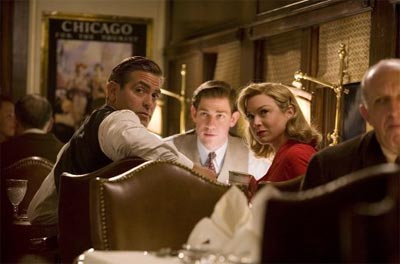 George Clooney: OK, no. I guess ultimately, nature provided the mud, but we shipped it all into that football field. That is the same field where we do the opening sequence where John runs a touchdown. We came back a month later and shipped in tons and tons of mud. We had to do mud testing to find the right mud that would stick to you. And it was all sort of funny the first day, because it was 70 degrees, and we all just jumped in the mud and you have to wallow around and you get up and you start shooting. But, first of all, that stuff adds another 20-30 pounds and all of a sudden you're running in mud. But, the next day, it was 20 degrees. And it was just mudsicles. We were like fudgicles out there. And then it was just miserable.
George Clooney: OK, no. I guess ultimately, nature provided the mud, but we shipped it all into that football field. That is the same field where we do the opening sequence where John runs a touchdown. We came back a month later and shipped in tons and tons of mud. We had to do mud testing to find the right mud that would stick to you. And it was all sort of funny the first day, because it was 70 degrees, and we all just jumped in the mud and you have to wallow around and you get up and you start shooting. But, first of all, that stuff adds another 20-30 pounds and all of a sudden you're running in mud. But, the next day, it was 20 degrees. And it was just mudsicles. We were like fudgicles out there. And then it was just miserable. It was about 2-4 days of truly miserable shooting. It took us a week to do that whole sequence. It was really complicated because a lot of that is CGI around it.
We couldn't have 50,000 people there. So, it was always about being able to shoot it and the piece you could use in this sort of a section. So, it was trickier than anything I have done before. But, the mud was terrible. As you can imagine. I did get the guys back though. The football team, all the guys, we put them in a hotel together and it was like a frat house. They were playing guitar hero all day long and shit. They were very funny and great guys. And after we finished shooting that mud sequence we had about three more weeks of work and they had a couple more scenes and they were supposed to be released two days earlier and wrapped about two days earlier. And I went to them and I said, 'We have to do a pick up shot out in the parking lot for the mud sequence.' And they are like, 'Ah, god, you're kidding me?' And I'm like, 'I know, it sucks, but we didn't get a shot, a close up when you guys are all covered with mud and you stand up and you look back.'
So, I keep them for two days. I bring them out to the sat the day before it's about an hour drive. I leave them in the trailer and I'm like, 'Send them home.' 'Sorry guys we didn't get to you today' just so they would know that we were really shooting. I set up a giant green screen on the roof of this parking lot. Got a big tub of mud, about this big, had them all of them laying in the mud, rolling around. The whole crew is on it. Everybody is in on it. Wardrobe, everybody. And we are shooting the whole thing - it will be on the DVD - and they are wallowing around in mud. I made them rehearse and they had to lay on the ground stand up in front of the green screen and look sad. We set it up for about a half hour. Spraying them down, covering them with more mud. And then finally, I stand next to the camera and they are doing 'Rolling, speed.' And we've been rolling the entire time. 'And, y'know, we really don't need this shot.'
And they are going, 'Oh my god.' It was freezing cold and they were covered in mud. It was pretty great actually. It was worth paying them for an extra week just to keep them there.
Paul Fischer: Rolling around in the fun with John Krasinksi seems like it would have some very uncomfortable moments.
George Clooney: It was hot is what it was. (Laughs.) Johnny is, first of all, incredibly funny as you guys know. He's sharp and funny and really composed for a 27-year-old. I'm sort of shocked by that, but the only thing I can tell you is that it looks more fun than it is, the idea of rolling around in mud, but if I was going to roll around in mud, John Krasinski is the guy I'd like to do it with. He's fantastic.
Paul Fischer: You mentioned not wanting to give this film too much of a modern slant. I'm just curious, would a team in 1925 be integrated?
George Clooney: They were all integrated then. It was like 1940. There was a lot to do with that actually. There were quite a lot of black players in football in the 20s. And then when the rules came in and money became an issue then they got rid of them all and they weren't back until much, much later. That was one of the really interesting thing we found out. There was a lot of interesting things. We couldn't use actual teams, NFL teams because we had the kids smoking and drinking and they were like, 'That never happened.' And you're like, 'OK.' (Laughs.) So, it's not the Duluth Eskimos it's the Duluth Bulldogs.
Paul Fischer: Do you know what you might direct next?
George Clooney: I think so. There is a play that is about to get made in New York that we are working on a screenplay of called 'Farragut North.' It's a really interesting. It may be the next one, but it would be next year.
Paul Fischer: Would you act in that as well?
George Clooney: Don't think so. I think there are a lot better actors for that then me. It's actually interesting though. It's about running for president. This was a play that was coming out long before people were talking about the election. It's not the same thing. It's not about Barack and Hillary and all that or Elliot Spitzer.
Paul Fischer: They are talking about brining the original characters back to "ER" for the final season, have you been approached?
George Clooney: All this stuff came up on the Internet, I got calls yesterday saying, 'I heard you are going back to 'ER.'' I dunno. It depends who asked me. John Wells and I are good friends. I have a funny feeling it's not really fair to the other actors on the show. It's not something I'm against. Literally, my office is, I saw them yesterday, is 50 feet from the 'ER' stage. They are still family there. It's not like I've gone away.
Paul Fischer: How are you getting ready for the summer?
George Clooney: I have the diet of alcohol. `
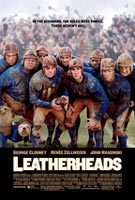
Leatherheads
Starring: George Clooney, Renee Zellweger, John Krasinski, Jonathan PryceDirector: George Clooney
Genre: Comedies
Screenwriter: Duncan Brantley, Rick Reilly
Producer: Grant Heslov, Casey Silver
Composer: Randy Newman
Synopsis:
Oscar® winners George Clooney and Renée Zellweger match wits in Leatherheads, a quick-witted romantic comedy set against the backdrop of America's nascent pro-football league in 1925. Clooney plays Dodge Connolly, a charming, brash football hero who is determined to guide his team from bar brawls to packed stadiums. But after the players lose their sponsor and the entire league faces certain collapse, Dodge convinces a college football star to join his ragtag ranks. The captain hopes his latest move will help the struggling sport finally capture the country's attention. Welcome to the team Carter Rutherford (John Krasinski), America's favorite son. A golden-boy war hero who single-handedly forced multiple German soldiers to surrender in WWI, Carter has dashing good looks and unparalleled speed on the field.
This new champ is almost too good to be true, and Lexie Littleton (Zellweger) aims to prove that's the case. A cub journalist playing in the big leagues, Lexie is a spitfire newswoman who suspects there are holes in Carter's war story. But while she digs, the two teammates start to become serious off-field rivals for her fickle affections. As the new game of pro-football becomes less like the freewheeling sport he knew and loved, Dodge must both fight to keep his guys together and to get the girl of his dreams. Finding that love and football have a surprisingly similar playbook, however, he has one maneuver he will save just for the fourth quarter... --© Universal Pictures
MORE
- Viggo Mortensen The Road
- 24 Cast Reunion
- Aaron Eckhardt No Reservations
- Aaron Eckhart The Dark Knight
- Adam McKay Step Brothers Interview
- Alan Alda Diminished Capacity Interview
- Alan Alda Diminished Capacity Interview
- Alex Dimitriades
- Al Pacino Oceans 13
- Alan Rickman Snow Cake
- Alan Rickman Sweeney Todd



